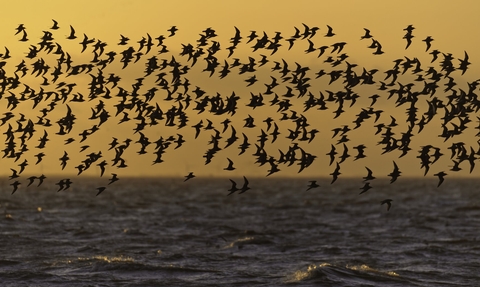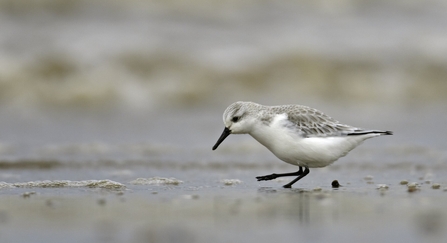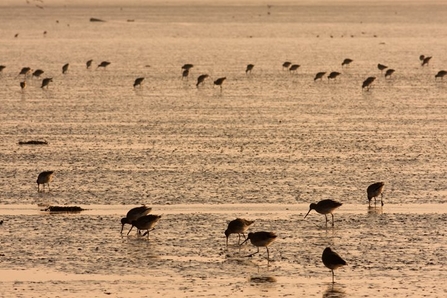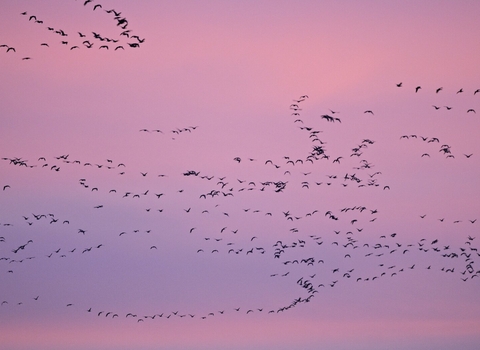
Flock of red knot in flight at The Wash estuary (credit: Chris Gomersall/2020VISION)
The Wash barrage proposal
The future of The Wash and its wildlife is at risk because of a proposal to build a 12km long concrete barrage across the mouth of the estuary to accommodate a deep-water port and tidal power generation. It also claims to provide flood defence benefits.
The plans are fronted by businessman James Sutcliffe, CEO of Centre Port Holdings Ltd. This is not yet a formal proposal for planning permission, so details are still unclear, and no feasibility or environmental assessment work has been carried out.
Alongside the RSPB, Lincolnshire Wildlife Trust (LWT), the Wildfowl and Wetlands Trust (WWT) and Wild Ken Hill Estate, we are urging government and developers to re-think this proposal to avoid catastrophic effects on nature and wildlife.
Joint Position Statement between Lincolnshire and Norfolk Wildlife Trusts
Updated: 12 June 2024

Sanderling feeding at the tideline of The Wash (credit: Chris Gomersall/2020VISION)
The Centre Port proposal for a barrage across The Wash would be catastrophic for the future of one of the country's most important sites for wildlife. We are strongly opposed to this proposal.
The Wash is one of the most important areas for wildlife in the entire country and is of national and international importance. There are a range of site designations that stand testament to the wide range of habitats and species for which the estuary is rightly famous. It is the UK's most important estuary for wild birds, home to the largest common seal colony in England, and the intertidal sandbanks support important local fisheries.
The impacts of the barrage would irrevocably change the whole nature of the estuary, and likely destroy many of its unique features. Our specific concerns are as follows:
- Impact on National Nature Reserves: Landfall for the barrage is proposed to be at the edges of The Wash, and would result in the destruction of Norfolk Wildlife Trust's National Nature Reserve (NNR) at Holme Dunes, as well as Gibraltar Point NNR managed by Lincolnshire Wildlife Trust.
- Impact on local livelihoods: Changes in the way water and sediment is able to move in and out of the estuary would mean that the intertidal sandbanks relied on by wildlife and the local fishing fleet would likely be lost.
- Impact on coastal flooding risk: Claims that the barrage would answer coastal flood defence concerns appear unsubstantiated. The coast is already protected by a range of built and natural flood defences, with plans for future adaptation covered in Shoreline Management Plans. The barrage would instead likely transfer flood risk to other areas of the North Norfolk and Lincolnshire coasts.
- Impact on inland flooding risk: The barrage would increase flood risk from river flooding. The Wash drains 10% of England’s land area through the rivers Ouse, Nene, Welland, Witham and Steeping. The barrage would likely restrict the open flow of the rivers into the North Sea, resulting in greater sediment deposition within channel and increasing flood risk.
- Impact on water quality River water high in phosphates and nitrates blocked by a barrage from flowing freely into the North Sea would have significant impacts on the water quality of the estuary, impacting on wildlife and on local livelihoods.
- Impact on UK net zero: We are concerned at claims that the barrage would reduce greenhouse gas emissions by providing a green energy hub. The sheer amount of concrete needed to build a wall across the whole estuary, with its significant carbon costs, as well as the disruption to natural habitats which act as an important carbon store, mean that any chance of the barrage contributing to the national 2050 net-zero legal target is vanishingly slim.

Black tailed godwit on The Wash (credit: Dave Kilbey)
Conclusion
We know society will face challenges with rising sea levels in the future and there is a genuine debate to be had about the future of our coastline. We believe that natural coastal habitats have a key role to play in future flood protection, but this proposal will clearly do far more harm than good. Lincolnshire and Norfolk Wildlife Trusts are therefore strongly opposed to this proposal.

Pink-footed geese flying over The Wash at dawn (credit: David Tipling/2020VISION)
Want to know more?
We are working with partners in Norfolk and Lincolnshire to defend The Wash for wildlife and people.
